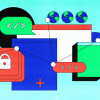Computer Coding: Not for Geeks Only
The Web-based backlash against the Stop Online Piracy Act, a bill aimed at taking down overseas distributors of copyrighted movies and music, was much like the Internet itself: decentralized, anarchic, and powerful enough to help persuade Senate Majority Leader Harry Reid (D-Nev.) to shelve the bill on Jan. 20. There was no official slogan for the public pushback against perceived government meddling with the Web, but the unofficial one might have been a headline that appeared on the online magazine Motherboard: “Dear Congress, it’s no longer ok to not know how the Internet works.”
A growing number of people agree that not only should Congress understand how software is made, so should everyone. Designers, economists, doctors, and others with no direct connection to the technology world are embracing coding as a way to advance their careers, automate boring tasks, or just a means of self-improvement, a hobby like learning Spanish or doing crossword puzzles. And they have access to an expanding universe of free online coding tutorials from startups and universities such as Stanford and Massachusetts Institute of Technology. Programming is becoming “a much more fundamental piece of knowledge, similar to reading or writing,” says Andy Weissman, a partner at New York’s Union Square Venures, which led a $2.5 million investment round for Codecademy, a site that teaches people basic programming skills.










































































